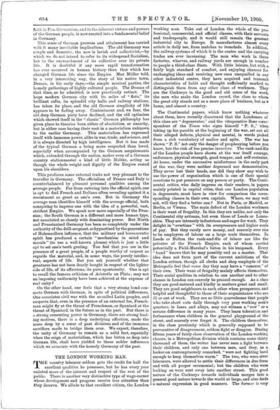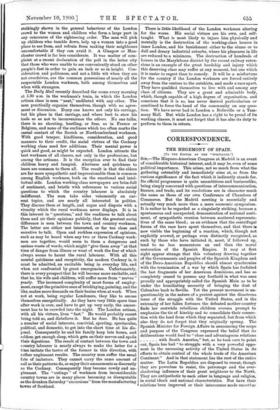THE LONDON WORKING MAN.
THE country labourer seldom gets the credit for half the excellent qualities be possesses, but he has every year enlisted more of the interest and respect of the rest of the public. There is another very distinctive type of wage-earner whose development and progress receive less attention than they deserve. We allude to that excellent citizen, the London working man. Take out of London the whole of the pro. fessional, commercial, and official classes, with their servants and tradespeople, and it would still remain the greatest industrial city in Europe. It manufactures almost every article in daily use, from matches to ironclads. In addition, the railway systems of which it is the centre and the carrying trades are ever increasing. The men who work in these factories, wharves, and railway yards are enough in number to people a third-class State. With little leisure, but with a fairly high standard of comfort, and enjoying chances for exchanging ideas and receiving new ones unequalled in any other industrial centre, they have acquired and transmit characteristics of habit and thought sufficiently marked to distinguish them from any other class of workmen. They are the Cockneys in the good and old sense of the word, the men who make the London crowd, the class to whom the great city stands not as a mere place of business, but as a home, and almost a country.
The Continental papers, which know nothing whatever about them, have recently discovered that the Londoners of this class are " degenerates," and the vituperative Boer corre- spondent of the Times who signs himself " P. S.," when taking up his parable at the beginning of the war, set out all their alleged defects, physical and mental, in words picked from a rich vocabulary of malice and spite. The war has shown " P. S." not only the danger of prophesying before you know, but the risk of too precise invective. The rank-and-file of the London people have shown at the war itself courage, endurance, physical strength, good temper, and self-restraint. At home, under the successive misfortunes in the early part of the war, they were neither depressed nor demonstrative. They never lost their heads, nor did they show any wish to use the power of organisation which is one of their special creations to put pressure on any person or party. The Conti- nental critics, who daily impress on their readers, in papers mainly printed in capital cities, that our London population is degenerate, must have in view for comparison the corre- sponding classes in their own capitals. Where, we may well ask, will they find a better one ? Not in Paris, or Madrid, or Berlin, or Vienna. The main defect of the London workmen is their want of frugality. In this they are unlike, not only the Continental city artisans, but even those of Leeds or Lancs.- shire. They are intensely industrious and eager for work. They delight in "overtime " with its overpressure and higher scale of pay. But they rarely save money, and scarcely ever rise to be employers of labour on a large scale themselves. In Leeds or Bolton the rank-and-file of labour are like the privates of the French Empire, each of whom carried potentially a Field-Marshal's baton in his knapsack. Every "hand" knows that he may possibly end as a master. That idea does not form part of the current ambitions of the London artisan, though all clerks and shop employes of the Metropolis feel that some day they may have a "concern" of their own. Their want of frugality mainly affects themselves. Their social qualities in relation to one another and to other classes in London can scarcely be praised enough. As a class they are good-natured and kindly in matters great and small. They are good neighbours to each other when prosperous, and helpful and thoughtful to those of their acquaintance who are ill or out of work. They are so little quarrelsome that people who take short cuts daily through very poor working men's quarters, in lanes and alleys, may not witness a " row " or a serious difference in many years. They learn toleration and forbearance when children in the general playground of the street, and scarcely ever forget it. The children themselves, in the close proximity which is generally supposed to be provocative of disagreement, seldom fight or disagree. During fifteen years of fairly close observation of the London working classes, in a Metropolitan division which contains some thirty thousand of them, the writer has never seen a fight between their children, and only one between men, and they, as a looker-on contemptuously remarked, " were not fighting hard enough to keep themselves warm." The two, who were river labourers, were allowed to settle their differences in due form and with all proper ceremonial ; but the children who were looking on were sent away into another street. This good nature of the Cockneys towards individuals merges into a general good nature towards the world at large, and also finds a natural expression in good manners. The former is very strikingly shown in the general behaviour of the London crowd to the women and children who form a leege part in any concourse of the sightseeing order. The men will pick up children who tumble down, help up a woman into a good place to see from, and refrain from making their neighbours uncomfortable if they can avoid it. A Glasgow or Man- chester crowd is far less considerate. It was matter of com- plaint at a recent declaration of the poll in the latter city that those who were unable to see conveniently stood on other people's feet in order to gain an inch or so in height. Con- sideration and politeness, and not a little wit when they are not overdriven, are the common possessions of nearly all the respectable London workmen, both among themselves and when with strangers.
The Daily Mail recently described the scene every morning at 5.30 a.m. in the workman's train, in which the London artisan class is seen "neat," undiluted with any other. The men practically organise themselves, though with no agree- ment or discussion. Dcery one knows not only his carriage, but his place in that carriage, and where best to stow his tools so as not to inconvenience the others. No one talks, there is no shouting, hustling, or fuss, as in France or Belgium, and none of the surliness which too often marks the casual contact of the Scotch or Northumberland workmen. With good temper, kindliness, consideration, and good manners to their credit, the social virtues of the Cockney working class need few additions. Their mental power is quick and good, as might be expected. London attracts the best workmen of all classes, not only in the professions, but among the artisans. It is the exception ever to find their children heavy and lumpish. Alertness and quickness to learn are common to them all. The result is that the elders are far more sympathetic and impressionable than is common among English workmen, both on the emotional and intel- lectual side. London working-class newspapers are brim-full of sentiment, and bristle with references to various social questions to which the country labourer is absolutely indifferent. The men take sides vehemently on cur- rent topics, and are nearly all interested in politics. They discuss them at length, and argue and dispute with a vivacity which the rural workman never displays. It is in this interest in " questions," and the readiness to talk about them and air their opinions publicly, that the greatest social difference is seen between the town and country workmen. The latter are either not interested, or far too close and secretive to talk. Open and reckless expression of opinions, such as may be heard when any two or three Cockney work- men are together, would seem to them a dangerous and useless waste of words, which might " give them away " at that time of danger from illness or want of work the fear of which always seems to haunt the rural labourer. With all this mental quickness and receptivity, the modern Cockney is, it must be admitted, an excitable being in everyday life, and when not confronted by great emergencies. Unfortunately, there is every prospect that he will become more excitable, and that he, his wife and children, will suffer more from " nerves " yearly. The increased complexity of most forms of employ- ment, except the primitive ones of bricklaying, painting, and the like, makes more demands on their brains when at work. When not at work, being regular Londoners, they like to amuse themselves energetically. As they have very little spare time after work is over, and have to get up very early, the amuse- ment has to be crowded into the night. The London artisan, with all his virtues, lives "fast" He would probably resent being told so, and disbelieve it. But he does. He has quite a number of social interests, convivial, sporting, spectacular, political, and domestic, to get into the short time at his dis- posal. Consequently he and his family keep late hours, and seldom get enough sleep, which gets on their nerves and spoils their digestions. The result of contact between the town and country labourer is nearly always to make the latter for a time imitate the tastes of the former in this direction, with rather unpleasant results. The country men suffer the usual fate of imitators. They cannot carry the same amount of sail as their patterns do, or enjoy their amusements as discreetly as the Cockney. Consequently they become rowdy and un- pleasant. The " outings " of workmen from inconsiderable country towns are in many places becoming as disreputable as the drunken Saturday "excursions" from the manufacturing towns of Scotland. There is little likelihood of the London workman altering for the worse. His social virtues are his own, and self- taught. What is most likely to injure hiM physically and mentally is the destruction of the working-class houses in inner London, and his banishment either to the slums or to dull and dreary industrial suburbs, where his pleasures in life are reduced to a minimum The destruction of hundreds of houses in the Marylebone district by the recent railway exten- sions is an example of the great hardship and injury which this deserving class may suffer at any moment, but one which it is easier to regret than to remedy. It will be a misfortune for the country if the London workmen are forced entirely away from the centres to the outskirts, and made a race apart. They have qualified themselves to live with and among any class of citizens. They are a great and admirable body, which, though capable of a high degree of organisation, and conscious that it is so, has never desired particularism or combined to force the hand of the community on any ques- tion. We have never had in London a Belleville or a Tam- many Hall. But while London has a right to be proud of its working classes, it must not forget that it has also its duty to perform to them in return.







































 Previous page
Previous page